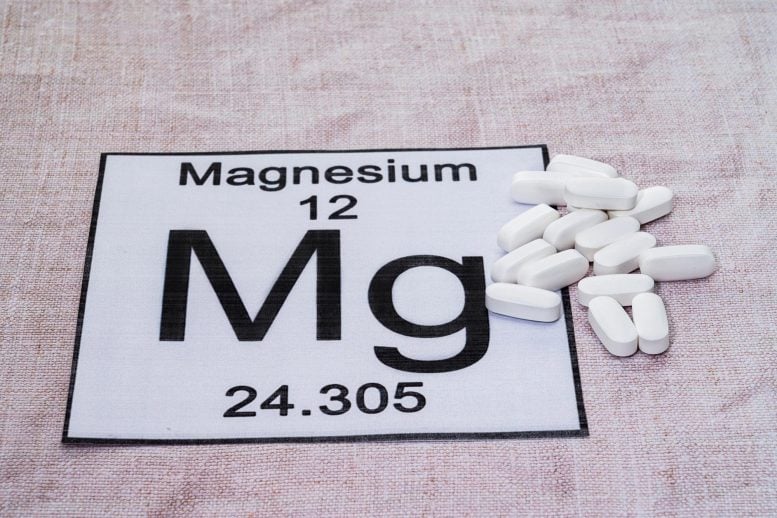
Many popular foods contain magnesium, including almonds, avocado, bananas, cashews, dark chocolate, and peanuts.
Magnesium is an essential mineral that plays a role in muscle relaxation, blood pressure regulation, and nerve function. Magnesium is also involved in the production of energy from food. That’s why some people call it the “energy mineral.”
Despite its importance, not everyone gets enough. Magnesium deficiency is relatively common in Western diets because so many people eat a heavily processed diet low in magnesium. Plus, they eat too few whole grains, nuts, seeds, and leafy green vegetables naturally high in magnesium. According to a study published in The Journal of the American Osteopathic Association, as many as half of Americans have low tissue levels of magnesium. But how would you know if you have it? Here are some signs and symptoms that you may not get enough magnesium in your diet.

You experience frequent muscle cramps
Although no one knows exactly what causes painful muscle cramps, low magnesium seems to play a role. Although studies looking at magnesium supplementation for muscle cramps are conflicting, there’s substantial anecdotal evidence that supplementing with magnesium helps prevent muscle cramps. This isn’t surprising since magnesium plays a key role in muscle contraction. So if you’re having frequent muscle cramps, it’s possible your diet needs more magnesium. But always see your doctor if you have muscle cramps, as some medical conditions can cause them, too.

If you’re stressed out, depressed, or anxious, that could be a sign you’re deficient in mg.
You’re depressed, anxious, and stressed out
Without enough magnesium in your diet, you may have a difficult time relaxing. You may also experience anxiety or symptoms of depression. Magnesium deficiency is associated with various mood changes because of the role it plays in nerve function. In fact, some psychiatrists and mental health professionals prescribe magnesium supplements for people suffering from anxiety or symptoms of depression. There are reports of people recovering from depression after supplementing with 125-300 milligrams of magnesium daily, but don’t supplement with magnesium without talking to your physician first.
You’ve got insomnia
Magnesium deficiency can also cause sleep problems. When you’re magnesium deficient, it’s harder to relax and enter a relaxed state. Can consuming more magnesium help? A double-blind, placebo-controlled study of elderly individuals with insomnia found that supplementing with magnesium significantly improved insomnia and measures of sleep quality. But before supplementing with magnesium, see your doctor and make sure there’s no other cause for your insomnia, such as sleep apnea.
Your blood pressure is creeping up
If your blood pressure is rising, magnesium deficiency could play a role. Magnesium helps regulate blood pressure by relaxing the muscles in the arteries and veins so that your blood pressure comes down. There are many reasons your blood pressure could be rising. If you have an unhealthy diet or lifestyle habits — like smoking, being overweight or obese, or eating too many processed foods — these factors may explain the rise. Some people are genetically predisposed to developing high blood pressure; it runs in their family. High blood pressure is also a risk factor for cardiovascular disease, so now would be a good time to ensure you’re getting enough magnesium in your diet. Magnesium plays a key role in heart health, so make sure you’re eating enough magnesium-rich foods.
You have low bone density
Magnesium deficiency has been linked to low bone density (osteopenia) and increased risk of osteoporosis, a condition in which bones become fragile and break easily. Magnesium plays a key role in bone metabolism. It helps activate vitamin D, which is important for bone health. In addition, magnesium helps transport calcium into the bone, where it can be incorporated into new bone.
Some research suggests magnesium may help prevent osteoporosis, although the results are mixed. Some studies show that magnesium supplements can increase bone mineral density, while other studies have not reached this conclusion.
It’s important to get enough calcium and vitamin D for bone health, but ensure you’re balancing it out with enough magnesium, too. Some health professionals believe the ratio of magnesium to calcium in an individual’s diet should be at least two to one for optimal health and bone density.

If you don’t get enough magnesium from the food you eat, your doctor may recommend magnesium supplements.
Are you at high risk for magnesium deficiency?
Certain factors and medical issues increase your risk of being deficient in magnesium.
You may be at increased risk of magnesium deficiency if you:
- Eat a diet high in processed foods and low in fruits and vegetables
- Are taking medications that prevent absorption of magnesium or cause diarrhea (diuretics, antibiotics)
- Drink alcohol regularly
- Have anorexia or bulimia
- Are recovering from alcoholism or alcoholism treatment
If you think you’re not getting enough magnesium, talk to your doctor about testing your level via a blood test. However, blood tests for magnesium deficiency will only detect moderate to severe magnesium deficiency. Your tissue levels may still be low, even if you have a normal blood level of magnesium.
The Bottom Line
Talk to your physician before taking a magnesium supplement, as there are many types. But you can also get more magnesium through your diet. The best dietary sources of magnesium include leafy greens, nuts, seeds, and legumes. Enjoy these healthy, natural sources of magnesium!
References:
- “Magnesium for Leg Cramps: Does It Work? What to Do If It ….” 8 Jul. 2019, .healthline.com/health/magnesium-for-leg-cramps.
- Serefko A, Szopa A, Poleszak E. Magnesium and depression. Magnes Res. 2016 Mar 1;29(3):112-119. doi: 10.1684/mrh.2016.0407. PMID: 27910808.
- Cao Y, Zhen S, Taylor AW, Appleton S, Atlantis E, Shi Z. Magnesium Intake and Sleep Disorder Symptoms: Findings from the Jiangsu Nutrition Study of Chinese Adults at Five-Year Follow-Up. Nutrients. 2018 September 21;10(10):1354. doi: 10.3390/nu10101354. PMID: 30248967; PMCID: PMC6212970.
- Schutten JC, Joosten MM, de Borst MH, Bakker SJL. Magnesium and Blood Pressure: A Physiology-Based Approach. Adv Chronic Kidney Dis. 2018 May;25(3):244-250. doi: 10.1053/j.ackd.2017.12.003. PMID: 29793663.
- “Optimum Calcium Magnesium Ratio – Nutritional Magnesium.” .nutritionalmagnesium.org/optimum-calcium-magnesium-ratio/.
- “Role of Magnesium in Vitamin D Activation and Function.” //pubmed.ncbi.nlm.nih.gov/29480918/.
- Abbasi B, Kimiagar M, Sadeghniiat K, Shirazi MM, Hedayati M, Rashidkhani B. The effect of magnesium supplementation on primary insomnia in elderly: A double-blind placebo-controlled clinical trial. J Res Med Sci. 2012 Dec;17(12):1161-9. PMID: 23853635; PMCID: PMC3703169.








I have suffered from severe muscle cramping in the legs on and off now for about 2 years. Recently I had a severe muscle cramping episode after playing a football match, then while I was recovering 2 days later I had another episode, then 1 more the next day, it was excruciating pain in both calves, both quads, both hamstrings right up to my obliques and even under my feet in my arches it rendered me immobile, I couldn’t walk! Days went by and my muscles were just right there on the verge of cramping up all the time, it was terrifying! I turned to google and started searching for answers which in turn led me to a Pharmacy where I spoke to a lovely woman who was very knowledgeable, she determined by looking at my tongue that I was heavily depleted in magnesium and recommended I start taking a magnesium supplement 3 times a day, bath in epsom salts and rub magnesium cream into my legs twice a day, after 2 days my condition settled right down. Im currently still using my crutches to walk and waiting on a neurologist to diagnose whether there could be an underlying health issue causing this problem. I have been prescribed some medication to take to relax the muscles, Orphenadrine citrate 100mg and Diazepam tablets 5mg. These have been successful also in treating these evil cramps. As a younger man I had a car accident and was thrown out of a moving car onto the road and had a lampost land on my leg, I would prefer to get thrown out of that car every day of the week over having to experience these evil cramps ever again! Gene-Paul.
Gene-Paul, my friend had the same leg cramp issues with pernicious anemia. Maybe see if you can get a B12 test in case?
I take vitamin D, Brain Health
Can I take Magnesium too.